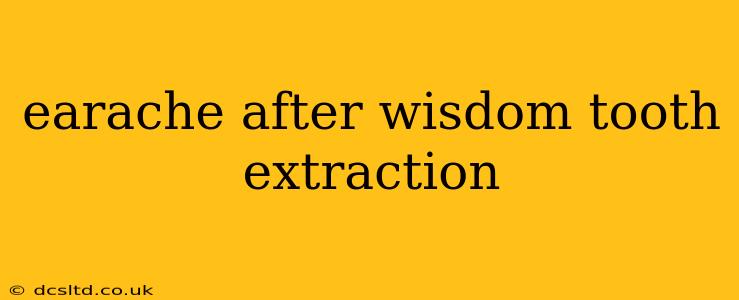An earache after wisdom tooth extraction is a common complication, often causing significant discomfort and worry. While usually not a serious issue, it's crucial to understand its causes, how to manage the pain, and steps to prevent it. This comprehensive guide will address your concerns and provide valuable information to help you navigate this post-surgical experience.
Why Do I Have an Earache After Wisdom Tooth Extraction?
The connection between your teeth and your ears might seem surprising, but they are closely linked anatomically. The nerves and blood vessels in your jaw and the area around your wisdom teeth are interconnected with those supplying your ears. Inflammation and swelling after surgery, therefore, can easily radiate pain to your ear.
Here's a breakdown of the common causes:
- Referred Pain: This is the most frequent cause. Pain originating from the extraction site (inflammation, swelling, nerve irritation) is perceived as pain in the ear due to the shared nerve pathways. Think of it like a phone line – the signal originates from one place but is felt in another.
- Dry Socket: While less directly linked to ear pain, a dry socket (alveolar osteitis) – a painful condition where the blood clot at the extraction site dislodges – can exacerbate existing pain and potentially cause referred pain to the ear. The intense pain from a dry socket can overwhelm other sensations, making the earache feel more prominent.
- Infection: Though less common, an infection at the extraction site can spread and cause pain in the ear. This is often accompanied by other symptoms like fever, increased swelling, and pus.
- Sinus Infection: Wisdom teeth are located close to the sinuses. Post-surgical trauma can sometimes trigger or worsen a sinus infection, resulting in ear pain (since sinuses and ears are interconnected).
How Long Does an Earache After Wisdom Tooth Extraction Last?
The duration of an earache varies depending on the cause and individual healing response. In most cases, the pain should subside within 2-3 days, as the initial swelling and inflammation reduce. However, if the pain persists for longer than a week, or worsens, it's crucial to contact your oral surgeon or dentist immediately.
What Can I Do to Relieve the Earache?
Several home remedies can help manage the discomfort:
- Over-the-counter pain relievers: Ibuprofen or acetaminophen (following your dentist's instructions) can effectively reduce pain and inflammation.
- Cold compresses: Applying a cold compress to your jaw and cheek for 15-20 minutes at a time can help reduce swelling and numb the area.
- Saltwater rinses: Gently rinsing your mouth with warm saltwater several times a day can help keep the extraction site clean and prevent infection. (Always follow your dentist's post-op instructions meticulously).
- Rest: Getting plenty of rest allows your body to focus its energy on healing.
Important Note: Avoid vigorous rinsing, spitting forcefully, or touching the extraction site.
Is an Earache After Wisdom Tooth Extraction Normal?
While many experience some degree of earache after wisdom tooth extraction, the intensity and duration vary. A mild, temporary earache is usually considered normal due to referred pain. However, severe, persistent, or worsening ear pain is not normal and requires immediate professional attention.
When Should I See a Dentist or Oral Surgeon?
Seek immediate medical advice if:
- Your earache is severe and doesn't improve with over-the-counter pain relievers.
- You experience increased swelling, redness, or pus at the extraction site.
- You have a fever.
- Your earache is accompanied by other symptoms like dizziness, vision changes, or difficulty swallowing.
Can I Prevent an Earache After Wisdom Tooth Extraction?
While you can't completely eliminate the risk, you can take steps to minimize it:
- Follow your dentist's post-operative instructions carefully. This includes medication, diet, and oral hygiene.
- Maintain good oral hygiene before and after the procedure.
- Avoid smoking and alcohol consumption, which hinder healing.
By understanding the causes and taking appropriate steps, you can manage the discomfort of an earache after wisdom tooth extraction and ensure a smoother recovery. Remember, your dentist or oral surgeon is your best resource for advice and treatment. Don't hesitate to contact them with any concerns.
